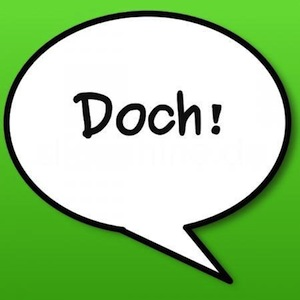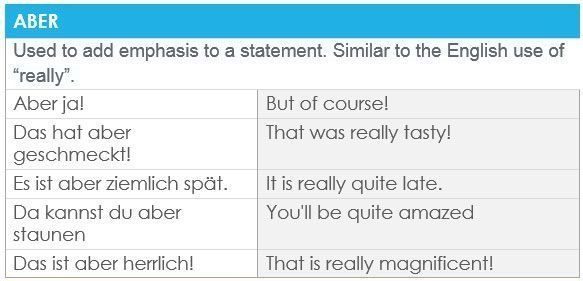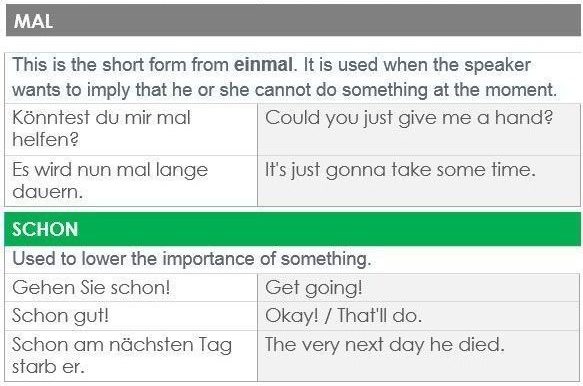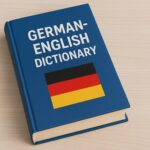 Modal particles are flavoring words that add a deeper element to language. In German, these could be words that soften the harshness of a comment, add a persuasive or suggestive element to a request or otherwise add subtle meaning to a sentence without changing the grammatical context.
Modal particles are flavoring words that add a deeper element to language. In German, these could be words that soften the harshness of a comment, add a persuasive or suggestive element to a request or otherwise add subtle meaning to a sentence without changing the grammatical context.
Most of the time, particles are only used in spoken contexts. However, in the digital age, they’re also commonly used in German social media, due to the informality of the medium. A lot of the time, the particle will follow the verb in the sentence—however, some come at the end.
When spoken, particles remain unstressed, so even though you’re excited to use your favorite particle in a sentence, hold back and don’t stress it—just throw it in there to add an extra flare to your speech. Native speakers will definitely take notice!
Modal particles can be broken down into a few different types: particles that affirm elements of a sentence, particles that negate or resign elements of a sentence and particles that intensify or highlight elements of a sentence.
There are also a handful of particles that don’t fall into any category and simply need to be memorized. These are just guidelines, however, as some particles have different meanings depending on context.
Affirmation
1. Aber
This can sometimes mean “indeed” or “however,” depending on how it’s used. Don’t get it confused with aber (but) when used as a coordinating conjunction.
“Donnerstag wird aber wärmer als Heute sein.” (But Thursday will be warmer than today.)
“Das Pferd ist aber sehr klug!” (The horse is [indeed] very smart!)
“Du bist aber süß!” (Aw, you’re so sweet!)

2. Ja
This one is possibly easiest to remember as an affirmation because of its generally translated meaning of “yes.” Much like aber, it’s used to affirm whatever the sentence is trying to say.
“Sein Geburtstag ist ja wichtig!” (His birthday is [indeed] important!)
“Deine Freundin ist ja attraktiv.” (Your girlfriend is [quite] attractive.)
Ja can also be used as an intensifier.
3. Wohl
Wohl is a very tricky particle to use because it’s usually translated to mean “well,” as in the phrase Ich fühle mich wohl (I feel well). However, as a particle it can mean that the speaker is assuming something to be true.
“Klaus isst nie Fleisch, er ist wohl Vegetarier.” (Klaus never eats meat, he is [assumingly] vegetarian.)
In this sentence, the wohl signifies that the speaker does not for certain know Klaus is vegetarian, but since he never eats meat the speaker is assuming it to be true.
It can also be used in an ironic context, when the speaker does know something to be the case, or wants to imply that it’s the case.
“Er hat sich einen Porsche gekauft.” (He bought himself a Porsche.)
“Er muss wohl jemanden beeindrucken.” (Looks like he needs to impress someone.)
Negation
 4. Doch
4. Doch
Ah, doch. It sometimes seems like this word is used so often just because it’s so hard to translate. In fact, it simply does not have a one-word English equivalent. The best way to think of it is “really!” or “on the contrary.” A children’s argument might look like this:
“Nein!” “Doch!” “Nein!” “Doch!” (No! Yeah! Nuh-uh! Yeah-huh!)
Here’s another example:
“Du spinnst! Er hat nicht vor seinem Professor gekotzt!” (You’re kidding! He didn’t barf in front of his professor!)
“Doch, und es war ihm nicht mal peinlich!” (On the contrary, he didn’t even find it embarrassing!)
Perhaps the true appeal of doch lies in how concisely it can be used. It says in one word what would take several in English. English is, however, a Germanic language after all, and what remains of doch can be seen in the word “though.” The usages don’t line up, but they’re in the same family.

5. Halt
While not quite as common as the previous particles, halt is one that’s still important to understand. When it’s used, it shows the speaker attempting to displace blame or burden onto another force. Depending on who’s speaking, though, you might hear halt all the time (think of, like, the often ridiculed valley girl).
“Alter, du hast mein ganzes Schnitzel aufgegessen!” (Dude, you ate my whole schnitzel!)
“Ich hatte halt Hunger!” (What can I say, I was hungry!)
“Wie hat sie denn darauf reagiert?” (How did she react, then?)
“Sie war halt richtig sauer.” (She was, like, totally peeved.)

Intensification
These particles exaggerate or intensify. They may be used to draw emphasis to something or to illustrate the significance or importance of part of a sentence.

6. Schon
Schon can be used to intensify the message that’s being conveyed or to show a sense of anger.
“Die Katze ist schon traurig!” (That cat really is sad!)
“Gib mir schon das Geld!” (Give me the money already!)
7. Mal
This one conveys a sense of interest, and can be used as a suggestion. It can also soften commands or make things sound less formal.
“Hörst du mal gern Reggaemusik?” (Do you like to listen to reggae music?)
“Moment mal, ich bin müde!” (Give me a minute, I’m tired!)
8. Nun
Nun is often used with questions to show an intensification or possibly anger in what is being asked. In more formal contexts, it just means “now.”
“Was machst du nun mit dem Gewehr?” (Now what are you doing with that gun?)
“Bist du nun blöd oder einfach nur faul?” (Are you [in fact] stupid or just lazy?)
9. Denn
Used almost exclusively to convey a subtle interest in something, denn is an excellent particle to use on first dates! Depending on how you say it, however, the word can also add annoyance or anger to a sentence. Don’t worry, though, if you’re speaking with the right tone of voice, nobody will ever get confused.
“Wo hast du denn Russisch gelernt?” (So, where did you learn Russian?)
“Was machst du denn mit dem Einhorn?” (What are you doing with that unicorn?)
“Bist du denn immer noch nicht fertig?!” (Are you still not finished?)







